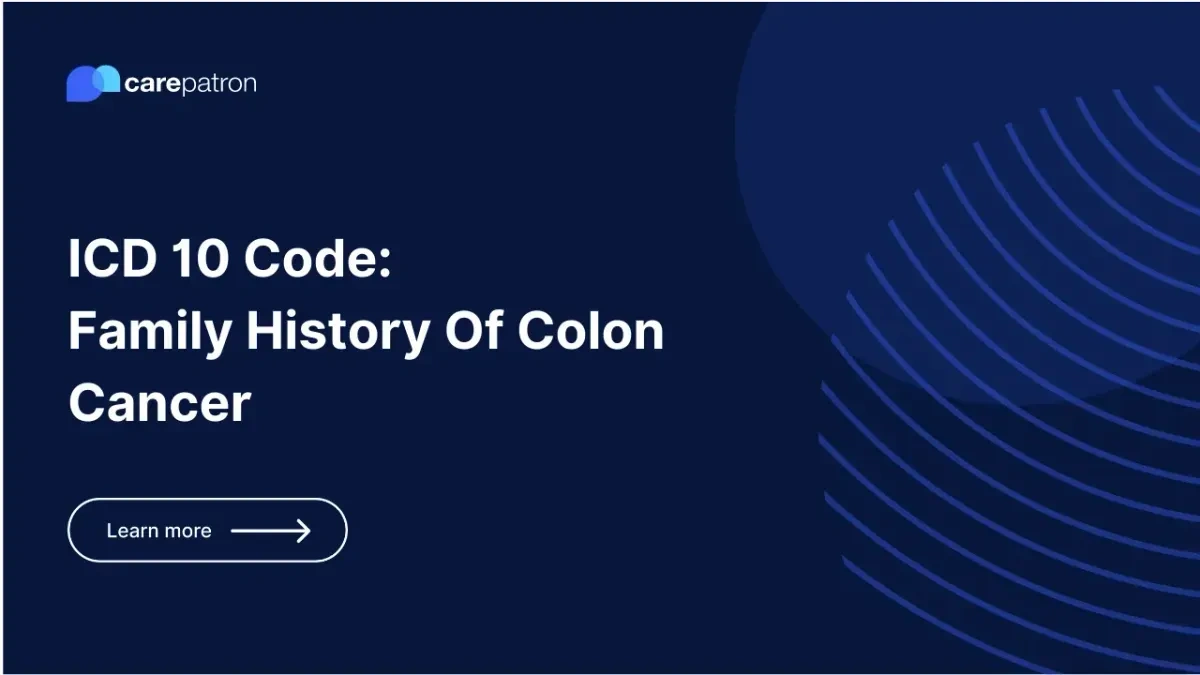
Gut Feelings, Real Talk
Let’s start with a scene a lot of us know. Picture this: You’re scrolling through group texts from your family—the usual GIF overload—when Dad chimes in: “Doctor says we need to talk about the family’s health history. Turns out, Uncle Jake’s colon cancer diagnosis isn’t just a fluke.”
Gut punch, right? That mix of worry, confusion, a little denial. It’s personal. But here’s the thing… it also matters big time to your doctor and even your insurance—sometimes in ways we barely notice. Enter the unsung hero (or, okay, slightly boring but important): the family history of colon cancer ICD-10 code.
Why This “Little” Detail Isn’t Small
What’s The Deal With Family History Codes?
If your doctor adds a note in your chart about family history of colon cancer, they’re usually talking about ICD-10 code Z80.0. Sounds clinical, huh? But it’s actually like leaving breadcrumbs for the future you.
Z80.0 is the code for “family history of malignant neoplasm of digestive organs.” Basically, it says: “Hey, let’s pay extra attention to this person, because cancer has already shown up in their family tree.” Reimbursement, insurance, preventive care—it’s all tied to that code according to coding sources.
But Wait… What About Polyps? And Other Cancers?
Glad you asked! If your family’s story includes colon polyps (those weird little growths doctors get very serious about), that matters too. There’s a whole parallel ICD-10 path for that called Family history of colon polyps ICD-10—and it’s not just paperwork. Polyps can be a pit stop, so to speak, on the road from healthy colon to colon cancer.
more broadly? Family history isn’t limited to just one organ. There’s a web of connections, and if you want to go down that rabbit hole, check out Family history of cancer ICD-10 too. It’s all part of the same puzzle.
Your Family History, Your Screening Roadmap
How Knowing Your Code Changes the (Screening) Game
Let’s get honest: Colonoscopies aren’t exactly at the top of anyone’s bucket list. But, if you have the Z80.0 code (which you’d get if, say, your dad, brother, or grandma had colon cancer), suddenly your roadmap looks different.
No code? Guidelines say start screening at age 45 if you’re average risk. But if you have a family history, your doc might want to get a jump on things—screening earlier, or even more often according to the American Cancer Society. Sometimes as early as age 40, or a full decade before your relative was diagnosed according to preventive screening experts. The more pieces of this story your doctor knows, the better they can protect you… sometimes before you even worry at all.
Quick Table: When Z80.0 Makes a Difference
| Situation | Screening Recommendation | Relevant ICD-10 Code |
|---|---|---|
| Average risk, no family history | Start at age 45 | Routine, no Z80 needed |
| Family history: colon cancer (parent, sibling, child) | Begin ten years before your relative was diagnosed, often as early as age 40 | Z80.0 |
| Family history: colon polyps | Sometimes earlier and more frequent screening | Check out Family history of colon polyps ICD-10 |
Have you ever wondered if paperwork could actually save your life? In this case… yep.
Talking Family Health Isn’t Just Small Talk
“Hey, What Runs In Your Family?” — Why That Chat Matters
Most of us dodge this convo. Talking about someone else’s cancer? Awkward. But it can be a lifeline.
Let me tell you about my old neighbor, Molly. She thought her stomach aches were just stress. But one day—after hearing about her aunt’s colon cancer at a family picnic—she actually told her doctor about it. Her doc flagged her for early screening. They found a polyp, zapped it, and she went home to binge reality TV none the wiser. If Molly hadn’t shared, she wouldn’t have had that chance to act early—or to dodge a bigger, scarier health bullet down the road.
It’s Not Just You… It’s Your Whole Family Tree
Think about it—if someone in your family had colon cancer AND if you know the details, you hold powerful info. That affects your siblings, your kids, even your cousins (yup, second-degree relatives can sometimes shift the risk needle). Suddenly, it’s not just a story, it’s a guidepost for health decisions. Even if you’re a little iffy on the details (“Was it colon or rectal cancer?”), bring it up. Imperfect information is better than none.
And in case your family history leans toward polyps instead of full-blown colon cancer, don’t forget to loop in what you know about Family history of colon polyps ICD-10 when you’re at the doctor’s office. It just might be the piece that nudges your provider to recommend more frequent checks.
Don’t Let Language—or Paperwork—Trip You Up
“Personal” History Isn’t the Same As “Family” History—Here’s Why
Small but important: Your personal medical history and your family’s are two separate things in the ICD-10 code universe. Yours (if you previously had colon cancer) would land under a code like Z85.038. Your family’s colon cancer? That’s our old pal, Z80.0. If your relative had polyps, check out those specific polyp codes instead (yep, even in coding, the devil is in the details).
I once heard about a patient who got denied insurance coverage for a screening because the wrong code was punched in—a “personal” history instead of a “family” one. It took some loud phone calls (and a very persistent medical coder) to straighten it out. Moral of the story: when in doubt, double-check what’s landed in your chart.
ICD-10 Codes… in the Real World
Doctors, nurses, even those admin folks in the back room—they’re all juggling these details so insurance will step up, and so your screenings land when and where you actually need them. Codes like Z80.0 or the one for Family history of cancer ICD-10 aren’t just for show—they open doors for early detection, grant access to precision preventive care, and help YOU stay on top of things (even if, let’s be real, paperwork isn’t your thing).
Screening Rules: Not One-Size-Fits-All
Guidelines Are Changing—And Here’s What That Really Means
So, rule of thumb used to be colon cancer screenings started at 50. Now? The U.S. Preventive Services Task Force, American Cancer Society, and pretty much every doctor who knows their stuff say 45 is the new 50 according to research—partly because cancer cases in younger people are ticking up report from Stat News. (Honestly? It’s a huge wake-up call for all of us.)
But here’s where it gets personal again: If you have that family history of colon cancer ICD-10 code, you may need to start even earlier, and keep at it longer than your average-risk friends or neighbors. It’s less about the number, more about the story your genes are trying to tell you.
How to Make Sure You Don’t Fall Through the Cracks
- Ask relatives (especially grandparents, aunts, uncles) if anyone had colon cancer or colon polyps.
- Tell your doctor EVERYTHING—even guesses help. “I think my mom’s sister had something with her colon, not sure what.”
- If you’re nervous about what’s in your medical file, just ask: “Hey, does my chart show a family history of colon cancer?”
- Don’t just rely on the doctor—destiny is in your details.
If you’re still making sense of the broader cancer picture, the Family history of cancer ICD-10 breakdowns can help connect the dots, especially if you’ve got several family members whose diagnoses sound similar (but not quite identical).
Stories That Hit Home… and Stay With You
Real Life: Why This Isn’t Just “Red Tape”
A friend of mine—let’s call her Jamie—used to roll her eyes every time her mom pushed for health updates at family dinners. Turns out, Mom was onto something. Jamie’s grandfather, her uncle, even her distant cousin had all had colon issues (of varying seriousness). Once Jamie finally mentioned this mix to her new doctor, she was flagged for early colonoscopy.
She was nervous. Who isn’t? But guess what: They found a single polyp—removed it easily, totally benign. With her family code now squarely in her chart, she started screening more regularly. She jokes now that she’s “the family historian.” Her siblings all got checked, too. If she’d kept it quiet, who knows what they’d be missing now?
Yours Could Be the Voice That Saves the Day
All those little details—Z80.0, your family history of colon polyps, the age your uncle was diagnosed—they matter. To you… and maybe even more to the people who come after you.
Wrapping Up: Take This Momentum and Run With It
Look, you don’t have to memorize the alphabet soup of ICD-10 codes to take charge of your health story. But here’s what does stick: Family history of colon cancer ICD-10 (Z80.0) is way more than dull paperwork. It’s the shortcut that signals to your care team, “Pay extra attention. Let’s check sooner, not later.”
Whether you’re mapping out screenings for the first time or just wondering if it’s worth bringing up that random conversation you had with a cousin at Thanksgiving… do it. Be the one who says something. Be the one who asks. The data, the codes, the algorithms—they’re all just tools that work best when you bring your whole story to the table.
So here we are—another reminder (from your friend who cares): Your family’s journey matters. Your future self will thank you for being a little nosy, a little persistent, and for never letting fine-print health codes hold you back. Next time you call your relatives? Maybe check in on those health stories too. Your gut—and your heart—will thank you for it.


















Leave a Reply
You must be logged in to post a comment.